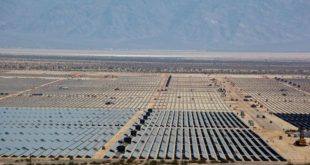Europe Continues to Dominate Solar Market in 2011
 El Segundo, Calif., March 25, 2011—Despite brewing trouble for the solar industry in the region, Europe in 2011 will continue to account for the lion’s share of photovoltaic (PV) installations in the world, claiming 68.6 percent of the global total, according to the latest IHS iSuppli research.
El Segundo, Calif., March 25, 2011—Despite brewing trouble for the solar industry in the region, Europe in 2011 will continue to account for the lion’s share of photovoltaic (PV) installations in the world, claiming 68.6 percent of the global total, according to the latest IHS iSuppli research.
Comprising nine of the world’s 15 major solar markets, European PV installations this year will amount to 14.3 gigawatts (GW), more than two-thirds of the global level of about 20.9 GW. Europe will be home to the world’s two largest solar markets—Germany, with an estimated 7.1 GW; and Italy, with 4.1 GW—as well as seven other important PV territories including, in descending order, France, Belgium, the United Kingdom, the Czech Republic, Spain, Greece and Bulgaria, as shown in the attached table.
In comparison, the United States—the third largest solar market worldwide—is projected to see 2.1 GW of PV installations in 2011, IHS iSuppli research indicates.
Notwithstanding Europe’s majority hold on global solar installations, its 68.6 share of market in 2011 will be a step down from 80.0 percent last year, when European installations reached 13.8 GW. Growth for the region also will decelerate this year, declining to 4.3 percent, down from a notable 146 percent expansion in 2010. In particular, bad news and uncertainty from specific European markets will serve to dampen overall PV prospects in 2011 for the continent.
The good news vs. the bad
While Europe is continuing its dominance, the region faces challenges in one of its key countries: Italy.
“Italy had been expected to be the star performer of the European market in 2011,” said Henning Wicht, senior director and principal analyst for PV systems at IHS. “However, on March 3, the Italian government changed its solar policies, implementing changes in its tariffs that make the PV market in the country less attractive to investors starting in June. While the Italian government is expected to fundamentally continue to support PV, installations in the country will decelerate in 2011 compared to earlier expectations—although they won’t stall.”
Installations in Italy in 2011 will amount to 4.1 GW, up 14.6 percent from 3.6GW in 2010.
Compared to Italy, the PV market situation is weak in Germany. Investors are still hesitating and awaiting lower system prices. System prices must reach 2.0 to 2.2 euros per watt to spur installations of large systems.
Slow demand in Germany already caused inventory at wholesalers to increase, a phenomenon that is now slowing down orders.
Although Germany is currently at the forefront of the global PV trade, the market here is expected to peak before four years are out, Wicht added. By 2015, German solar installations will stand at 5 GW, less than the country’s 2010 level.
In addition to the uncertainty facing the German PV sector, measures are under way to reduce the business proposition for solar investors in Spain, France and the Czech Republic, IHS iSuppli analysis shows.
In the case of Spain, the government is set to reduce the funding of existing solar power parks by approximately 30 percent. In early March, France implemented a new scheme supporting new installations of 500 megawatts (MW) per year. In addition, earlier accorded projects will be built. Estimates for France call for 1.3 GW to be installed in 2011. And in the Czech Republic, where state support for ground-mounted plants will end in March, PV installations for the year will contract severely, falling to 350 MW from 1.3 GW in 2010.
Looking ahead, the highest-growth PV markets in Europe will be Belgium, Bulgaria, Spain and the United Kingdom. By 2015, however, the United States will become the world’s single largest solar market, overtaking Germany, which will drop to second place after years of being at the pinnacle.
Learn more about the latest developments in the PV industry with the IHS report entitled: PV Installations, Systems, and Inverters: What is Ahead for 2011?
 Alternative Energy HQ solar power for homes, wind energy, and bio fuel issues
Alternative Energy HQ solar power for homes, wind energy, and bio fuel issues






